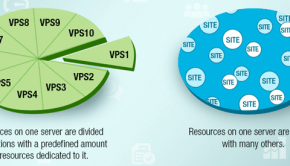Understanding the Differences Between Fully Managed and Self-Managed VPS Hosting
What is VPS?
Speaking of hosting, we can say that VPS lies somewhere between shared hosting and a dedicated server: it’s a more economic solution than a dedicated server and it provides more privacy and security than shared hosting. How is this achieved?
Like shared hosting, a user of VPS shares the physical machine with other users. But at the same time, this sole machine works like a separate machine for each user. This is achieved by means of virtualization technology. This allows running numerous operating systems on one single server, this way creating several virtual servers acting like dedicated servers. This provides that your files and speed are in no way dependent on other users and that you have more control over the capacities that are dedicated to you.
When will you need a VPS?
If you own a small website, like a personal blog or something else which doesn’t have to deal with big amounts of traffic, millions of visits a day, etc., then you will do just fine with shared hosting. This is often the case in newly created or just generally smaller businesses. However, with the gradual evolvement of the business, many users are likely to require a more powerful machine. In this case, VPS will be an option for you.
Which kinds of VPS are there?
Usually, hosting providers provide two types of VPS according to management: a managed VPS vs an unmanaged VPS (known also as a fully managed VPS and a self-managed VPS). As you see from the name, the distinction between services comes from the way the virtual servers are managed. It doesn’t work like this with shared hosting, since there we have one operating system the management of which is organized by the hosting provider. With VPS, the users do have a choice, however, so they can select whether they wish to be responsible for the management of their VPS on their own or they want that the hosting provider takes care of it. Both options have their benefits and drawbacks and whom they suit better depends on the situation of the customer. So, let’s have a closer look at managed and unmanaged VPS.
What is Unmanaged VPS
As you may guess from the name, this kind of VPS is provided unmanaged. Well, eventually, it is managed, but by the customers themselves. The hosting provider is only providing them with the server as an available and functional physical machine, leaving the whole maintenance part to the customers. The consequences of this management model are, of course, lower costs and more control for the customer. That means a high degree of customization and self-reliance in making decisions: for example, sometimes this can be more beneficial to install the software yourself since otherwise, you will have to wait for the support team to start acting, which will cost you time.
But more power means more responsibility, so there will remain many moments, the customer will have to be aware of: configuring the server, installing updates, solving technical troubles. This will require from the customer a decent level of technical expertise, enough time and dedication, or a team of experts in the company. So, this option is in the first place good for the customers who have enough experience in server management and know, how to benefit from more freedom in technical decisions or a big company with its own IT department.
What is Managed VPS
In contrast to unmanaged VPS, the management of this one is covered by the hosting provider’s company. This means that a team of experts will be responsible for all issues regarding server settings, support, updates, and so on: they will maintain your server, checking whether there are any troubles that can damage the performance of your website or make it even crash; they will always make sure that your server is up-to-date; they will monitor the system for traffic activity, ready to rescale the resources when needed to save it from crashing; they will protect your data by checking your files for vulnerability and performing regular backups; they will check your VPS for malicious and suspicious activities, like malware or spyware; finally, they will provide you with constant technical support, so you can go for it whenever you have troubles with your VPS.
This will require extra payment, but in many cases, this will be worth it. If you don’t have advanced experience in managing a server, don’t have your own team of IT professionals, or simply want to dedicate more time and resources to the development of other aspects of your business, then a managed VPS must be the option for you.
Conclusion
Any successful project needs a website and any successful website will need to grow at some point in time. So, switching from shared hosting to VPS hosting is much more likely a question of time. As soon as this moment arrives, go and check out the solutions by Hostzealot hosting provider. When choosing your VPS hosting solution, however, you’ll have to make up your mind about which type of VPS suits you better. To help you with it, we’ve prepared this article and hope that it was useful. Take care and see you next time!
Learn more about Managed and Unmanaged VPS
https://99robots.com/the-difference-between-shared-hosting-vps-and-dedicated-hosting/
Cover Image by Freepik
















